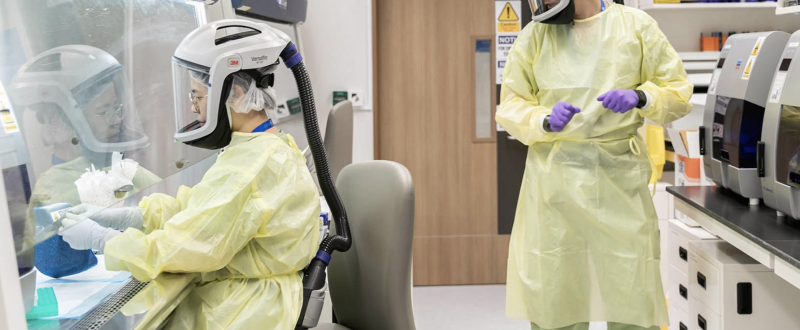
Enhancing leadership in laboratories across Asia and the Pacific
Health workforce, One Health Operations
South-East Asia Region, Western Pacific Region
During disease outbreaks, such as the current surge of mpox cases, staff in public health laboratories play a vital role in detecting, confirming and monitoring public health events. Recognizing the importance of laboratory workers for public health, the World Health Organization (WHO) − in partnership with the Association of Public Health Laboratories, United States Centers for Disease Control and Prevention, European Centre for Disease Prevention and Control, Food and Agriculture Organization of the United Nations and World Organisation for Animal Health − developed a Global Laboratory Leadership Programme (GLLP) to enhance national laboratory capacities in disease control and outbreak response.
WHO in collaboration with GLLP partners convened a workshop for national laboratory leaders from Bhutan, Cambodia, Indonesia, the Lao People’s Democratic Republic, Malaysia, Maldives, Mongolia, Nepal, Papua New Guinea, the Philippines, Sri Lanka and Viet Nam. Participants were introduced to core leadership competencies and the know-how to implement these in their respective countries. Additionally, the workshop provided laboratory leaders with an opportunity to connect with one other, facilitating a stronger network across Asia and the Pacific. This collaboration improves regional health security by uniting countries with standardized protocols, shared best practices and a framework to improve regional laboratory leadership.
Employing a One Health approach
Promoting a multisectoral, One Health approach, the goal of the GLLP is to enhance communication, foster collaboration and promote shared understanding and synergies among experts in human, animal and environmental health.
Emphasizing the importance of taking a One Health approach, Dr Jocelyn Isadore, Professional Development Manager with the Association of Public Health Laboratories noted that “the GLLP provides leaders from the human, animal and environmental sectors with an understanding and appreciation of the role of all sectors in the laboratory system. Multidisciplinary and multisectoral GLLP cohorts are encouraged to exchange knowledge and forge networks across sectors.”
Enhancing leadership in the laboratory workforce
While the nature of disease outbreaks requires laboratory leaders to respond using a mix of both managerial and technical skills, laboratory strengthening has in the past been more focused on the latter. Less emphasis had been placed on building competencies for leadership and management.
The GLLP helps to bridge this gap by providing laboratory leaders with the knowledge and skills needed to sustain efficient national teams to effectively advance disease prevention and control measures. Rejaynil Valdez, OIC-Chief of the Laboratory Service Section of the Ecosystems Research ang Development Bureau, Department of Environment and Natural Resources, Philippines described how the programme has strengthened both his leadership and management skills. “I am now working to improve our national laboratory system by incorporating the GLLP core values,” he added.
Echoing Valdez, Warawan Wongboot, a Medical Scientist, National Institute of Health and Deputy Director, Division of International Collaboration, Department of Medical Sciences, Ministry of Public Health of Thailand, shared: “I have significantly enhanced my laboratory leadership skills through the GLLP core competencies, particularly in management practices, communication, coordination and technical skills. This has prepared me to respond effectively to future public health threats.”
Advancing regional health security
The programme is advancing health security in Asia and the Pacific by strengthening laboratory capacities, enhancing early detection and improving rapid response to disease outbreaks. For instance, in Cambodia, “GLLP-trained personnel played a critical role in joint outbreak response during the recent cases of avian flu, coordinating efforts between animal and human health sectors,” said Filip Claes, Regional Laboratory Coordinator with the Food and Agriculture Organization of the United Nations. “This collaboration enabled faster detection and containment, minimizing the spread of the virus.”
Developing and sustaining the health security workforce − including the laboratory workforce − through mechanisms such as continuing education and training, among others, is a key priority for WHO as part of the Asia Pacific Health Security Action Framework, the South-East Asia Regional Roadmap for Diagnostic Preparedness, Integrated Laboratory Networking and Genomic Surveillance (2023–2027) and the Global Health Security Corps.